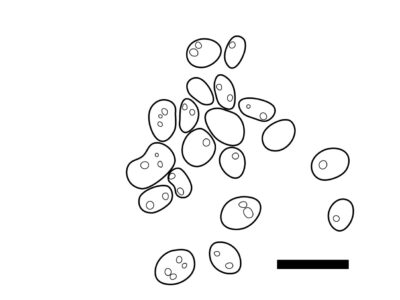Fungalpedia – Note 443, Hagleromyces
Hagleromyces F.M.P. Sousa, P.B. Morais, Lachance & C.A. Rosa
Citation when using this data: Tibpromma et al. 2024 (in prep.) – Fungalpedia, Yeast.
Index Fungorum, Facesoffungi, MycoBank, GenBank, Fig. 1
Classification: Saccharomycetaceae, Saccharomycetales, Saccharomycetidae, Saccharomycetes, Saccharomycotina, Ascomycota, Fungi.
On the basis of multiple gene analyses, Sousa et al. (2014) introduced Hagleromyces as a monotypic genus to accommodate Hagleromyces aurorensis. Hagleromyces aurorensis occurs as a yeast species in water tanks (phytotelmata) and is distributed throughout the state of Tocantins, Brazil (Soual et al. 2014). Soual et al. (2014) suggested that Hagleromyces has restricted physiology and is most likely copiotrophic, living in environments with high concentrations of simple carbon sources. They do not produce true hyphae or pseudohyphae by multilateral budding, produce ovoid to ellipsoid, and occur singly or in pairs on YM agar (Soual et al. 2014). Moreover, an ascosporic state was not observed. No other species have been introduced to this genus, which remains monotypic.
Type species: Hagleromyces aurorensis F.M.P. Sousa, P.B. Morais, Lachance & C.A. Rosa
Other accepted species: This genus is monotypic.
Figure 1 – Budding cells of Haglerimyes aurorensis (UFMGCM-Y311, Holotype). Scale bars = 5 mm. Redrawn from Soual et al. (2014).
Reference
Entry by
Han L-S, Center for Yunnan Plateau Biological Resources Protection and Utilization, College of Biological Resource and Food Engineering, Qujing Normal University, Qujing, Yunnan 655011, P.R. China.
(Edited by Saowaluck Tibpromma, Samaneh Chaharmiri-Dokhaharani, & Achala R. Rathnayaka)
Published online 29 November 2024
